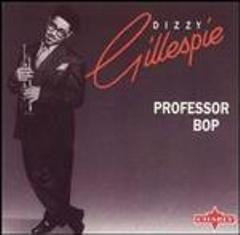Dizzy Gillespie – Professor Bop (1995)
Dizzy Gillespie – Professor Bop (1995)

01. Blue’n’Boogie 02. Grovin’ High 03. All The Things You Are 04. Dizzy Atmoshere 05. Hot Mouse 06. Our Delight 07. Good Dues Blues 08. Ray’s Idea 09. Things To Come 10. Emanom 11. Blue And Sentimental 12. When It’s Sleepy Time Down South 13. Blue Moon 14. Night And Day 15. The Man I Love 16. Sweet And Lovely 17. My Old Flame 18. The Very Thought Of You 19. Pennies From Heaven 20. Jealousy Dizzy Gillespie - Trumpet Abrams - Sax (Tenor) Taswell Baird - Trombone Gabriel Beauvais - Viola Joe Benjamin - Bass John Brown - Sax (Alto) Ray Brown - Bass Dave Burns - Trumpet Don Byas - Sax (Tenor) Scoops Carey - Sax (Alto) Big Sid Catlett - Drums Bill Clark - Drums Kenny Clarke - Drums Cozy Cole - Drums Talib Dawud - Trumpet Kenny Dorham - Trumpet Bill Frazier - Sax (Tenor) Dexter Gordon - Sax (Tenor) Charles "Majeed" Greenlee - Trombone Lou Hackney - Bass Al Haig - Piano Joe Harris - Drums Clyde Hart - Piano Milt Jackson - Piano, Vibraphone Howard E. Johnson - Sax (Alto) Al Jones - Drums Irv Kluger - Drums Wade Legge - Piano John Lewis - Piano Leon Locatelli - Violin Warren Luckey - Sax (Tenor) John Lynch - Trumpet Matthew McKay - Trumpet James Moody - Sax (Tenor) Al Moore - Trombone Alton Moore - Trumpet Pee Wee Moore - Sax (Baritone) Raymond Orr - Trumpet Remo Palmieri - Guitar Frank Paparelli - Piano Charlie Parker - Sax (Alto) Leo Parker - Sax (Baritone) Alice Roberts - Vocals Arnold Ross - Piano Curly Russell - Bass Murray Shipinski - Bass Art Simmons - Piano Slam Stewart - Bass Sonny Stitt - Sax (Alto) Gordon Thomas - Trombone Benny Vasseur - Trombone Chuck Wayne - Guitar Elmon Wright - Trumpet
Possibilities for collecting Dizzy Gillespie material are as varied as harmonic inversions on a set of bebop choruses. These 20 tracks first showed up in this sequence circa 1994 as a release on the Atlantis label. The French Le Jazz imprint did a repackaging variation the following year, then again as the '90s came to a close and the legend of the man with the bent horn passed into another century. The original label perhaps sinking into the ocean, another firm calling itself Recall came up with a 2002 expansion, this time titled Professor Bebop and consisting of two discs, 45 tracks, and expanded portions of Gillespie silliness such as the carnivorous "Hey Pete! Let's Eat More Meat." In both cases the program sticks to material recorded between the mid-'40s and early-'50s, meaning that many of the popular compositions that show up in bebop fake books are unveiled in their full glory. The trumpeter's prominence in this "Dizzy Atmosphere" of progressive creativity earned him the "professor" nickname, also exploited on other available compilations with confusingly similar names such as Bebop Professor. In all cases the producer is faced with a similar juggling act, the balls in the air being Gillespie's mind-blowing relationship with alto saxophonist Charlie Parker, his ambitious attempts at large ensembles including a '40s orchestra, and his stage persona as a goofball and associated theme songs.
Some listeners may find the latter kind of material as far from the glories of "Groovin' High" as Gillespie's South Carolina birthplace is from southern Borneo. The trimmer Atlantis program tends to stick to more substantial material, including music recorded during one of Gillespie's first big band escapades. In slightly less than an hour he tangles with a half-dozen bass players alone, one of whom sings along with his arco solos as if munching on a horsefly. On drums there are legends of both the swing and bebop styles as well as relatively unknown journeymen. Tadd Dameron and Gil Fuller are among the fine arrangers Gillespie brought in to assist in managing the nearly 100 different musicians lucky and skilled enough to have been involved in these tracks. The first six solid bopping blasts are a curtain opening on a Shakespeare play; Dameron bounces his theme "Our Delight" until it becomes just that. A taste of Fuller's concoctions ensues, the leader's at times frantic horn figures sent to rescue a damsel from the mouth of a carnivorous beast half trombone, half baritone sax. Like a melodrama with a flabby last reel, the second half of the program flounders in comparison due to a reliance on Tin Pan Alley interpretations, even considering the habit both sidemen and leader have of tossing off short inventions with the intricacy of an evening raga. Even when based on similar chord changes, the new themes concocted by bebop henchmen were detached from mushy sentimentality in a way that inevitably must have made jazz seem like a threat to mankind, to some people anyway. What is essentially just aesthetic power transmits easily through any and despite too many repackagings. --- Eugene Chadbourne, Rovi
download (mp3 @256 kbs):
uploaded yandex 4shared mediafire mega solidfiles zalivalka cloudmailru filecloudio oboom
Zmieniony (Piątek, 26 Wrzesień 2014 22:31)








